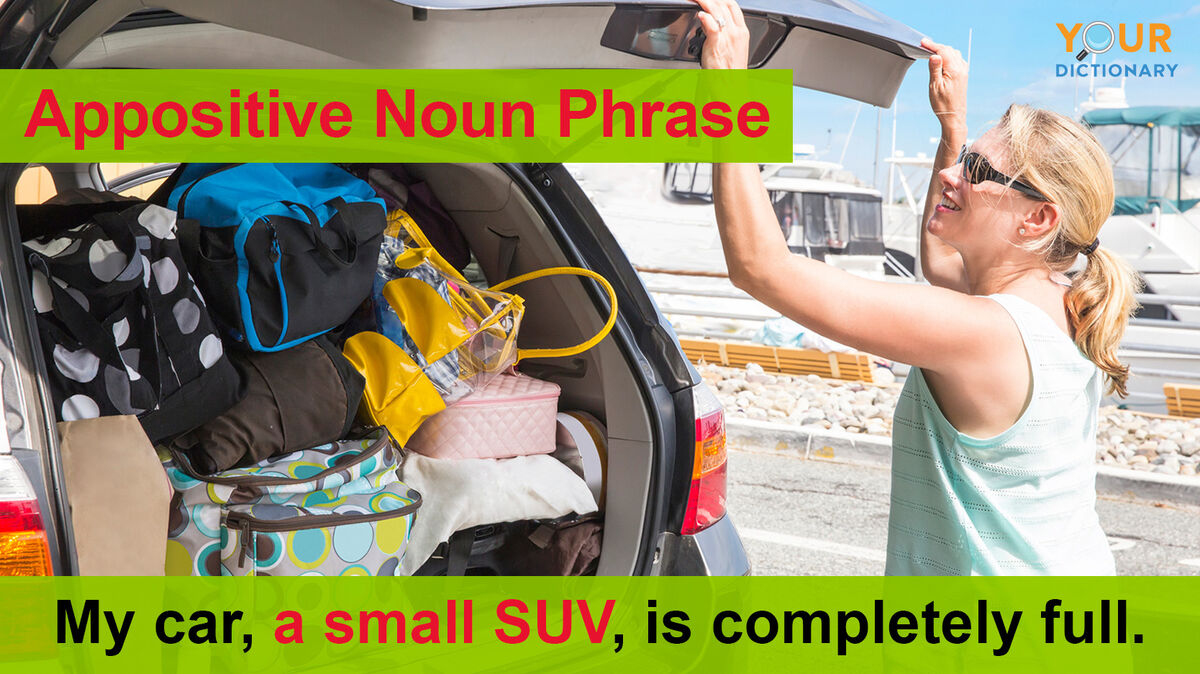
You may not realize it, but you use appositive noun phrases every day to provide more detail in your sentences. Appositives are two nouns that work together, where one identifies or further defines the other. Sounds almost abstract, right? Fear not, as soon as you review these appositive examples, it’ll all make sense.
Defining an Appositive Noun Phrase
What is an appositive? An appositive is a noun or a noun phrase that renames the noun next to it. It serves the purpose of adding information about another noun.
- For example, consider the phrase "The boy raced ahead to the finish line. "
- Adding an appositive noun phrase could result in "The boy, an avid sprinter, raced ahead to the finish line."
The sentence is still complete without the appositive. However, adding the appositive (an avid sprinter) presents more information about the other noun (boy).
Using Appositives
An appositive can come before or after the main noun, and it can be at the beginning, middle or end of a sentence. It has to sit beside the noun it defines. As a noun phrase, an appositive does not have a subject or a predicate, and so does not express a complete thought.
Don’t overuse appositives in your writing. All it takes is one too many, and a paragraph can become long, cluttered and confusing. Only use them when they can add to the character of the noun and provide more interest to your work.
Appositive Phrase Examples
Are you still wondering, "What is an appositive phrase?" Check out the examples below. The best way to become acquainted with any part of speech is to review examples, then practice using examples appropriately. The appositives noun phrases are marked in bold and the nouns they identify or modify are unerlined.
- A great civil rights leader, John Lewis left a lasting legacy.
- Former Vice President Walter Mondale died at the age of 93.
- College professor Steve Williams will review the scholarship applications.
- A small SUV, my car is completely full.
- A human garbage disposal, my brother consumed five cheeseburgers in one sitting last night.
- Gus, the family's cat, slowly crept up behind the kittens.
- The bookshelf, a large piece of furniture, was moved into the house first.
- The spider, a big and hairy creature, scared the children as they played in the grass.
- Kara's designer bag, the red Chanel, got stained with paint because she wasn't careful.
- They couldn't believe it when the little boy stood up to John, the biggest bully in school.
- A gigantic mountain of ice cream, Mary's sundae started to melt when she took it outside.
- A very strong man, Uncle Henry was able to carry the entire pallet of bricks by himself.
- My new puppy, a little Daschund, has stolen my heart.
- I am looking forward to having enchiladas, my favorite food, for dinner.
- My college roommate Kelley lives in Hunstville now.
- Leanne, the maid of honor from my wedding, is coming over this weekend.
- A two-door sedan, our rental car was completely full.
- Little Davey, my youngest nephew, is feeling sick.
- Jasmine was the belle of the ball in her new dress, a turquoise ball gown.
By reviewing examples of appositives and working them into your own conversations and writing, you’ll be well on your way to total mastery.
Appositives Love Commas
Did you notice all of the appositive examples are surrounded by commas? Appositive noun phrases are nonrestrictive, which means they can be left out of a sentence and the sentence will still make sense. For this reason, they should be surrounded by commas when used in a sentence. This indicates the appositive's helpful, but non-essential function. Commas are required for these types of phrases because they function as parenthetical expressions.
Noun Phrases vs. Noun Clauses
The appositive examples above should help clarify what appositives noun phrases are and how to use them. While you're in noun mode, take the time to learn more about other groups of words that function as nouns. Start by learning how to tell the difference between a phrase and a clause. Then, explore what noun clauses are and how to identify them.